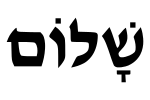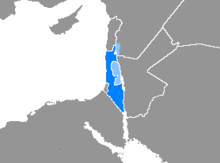Israeli Hebrew
| Modern Hebrew | |
|---|---|
| Israeli Hebrew | |
| עברית חדשה, ʿivrít ḥadašá[h] | |

The word shalom as rendered in Modern Hebrew, including vowel points
|
|
| Native to | Israel |
|
Native speakers
|
9.0 million (2014) including native, fluent, and non-fluent speakers. |
|
Early forms
|
Biblical Hebrew
|
|
Hebrew alphabet Hebrew Braille |
|
| Signed Hebrew (oral Hebrew accompanied by sign) | |
| Official status | |
|
Official language in
|
|
| Regulated by |
Academy of the Hebrew Language האקדמיה ללשון העברית (HaAkademia LaLashon HaʿIvrit) |
| Language codes | |
| ISO 639-3 | |
| Glottolog | hebr1245 |

The Hebrew-speaking world:
regions where Hebrew is the language of the majority
regions where Hebrew is the language of a significant minority
|
|
Modern Hebrew or Israeli Hebrew (Hebrew: עברית חדשה, ʿivrít ḥadašá[h], [ivˈrit xadaˈʃa] – "Modern Hebrew" or "New Hebrew"), generally referred to by speakers simply as Hebrew (עברית Ivrit), is the standard form of the Hebrew language spoken today. Spoken in ancient times, Hebrew, a Canaanite language, was supplanted as the Jewish vernacular by the western dialect of Aramaic beginning in the third century BCE, though it continued to be used as a liturgical and literary language. It was revived as a spoken language in the 19th and 20th centuries and is one of the two official languages of Israel, along with Modern Standard Arabic.
Modern Hebrew is spoken by about nine million people, counting native, fluent, and non-fluent speakers. Most speakers are citizens of Israel: about five million are Israelis who speak Modern Hebrew as their native language, 1.5 million are immigrants to Israel, 1.5 million are Arab citizens of Israel, whose first language is usually Arabic, and half a million are expatriate Israelis or diaspora Jews living outside Israel.
The organization that officially directs the development of the Modern Hebrew language, under the law of the State of Israel, is the Academy of the Hebrew Language.
The most common scholarly term for the language is "Modern Hebrew" (עברית חדשה ʿivrít ħadašá[h]). Most people refer to it simply as Hebrew (עברית Ivrit).
...
Wikipedia
